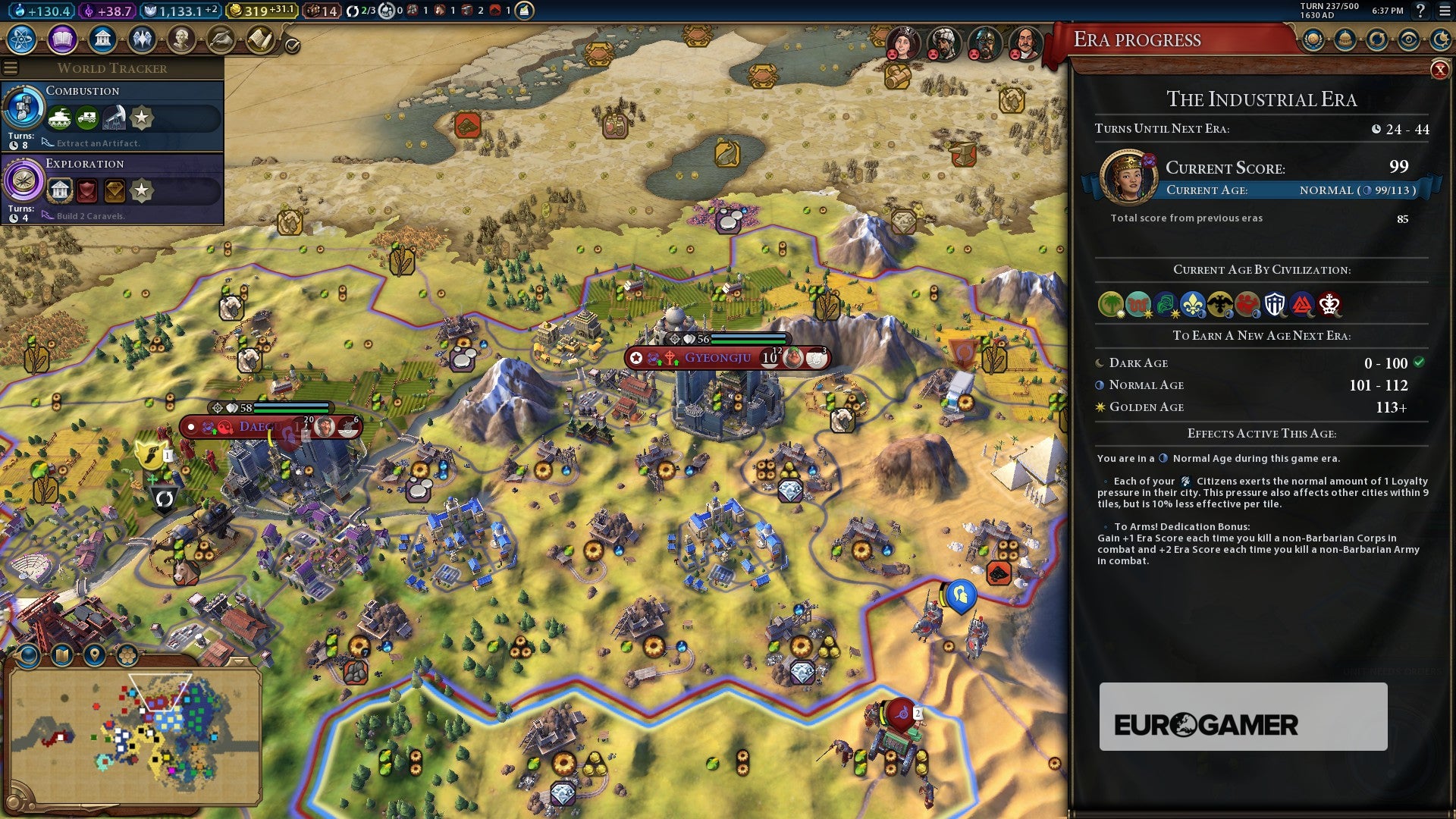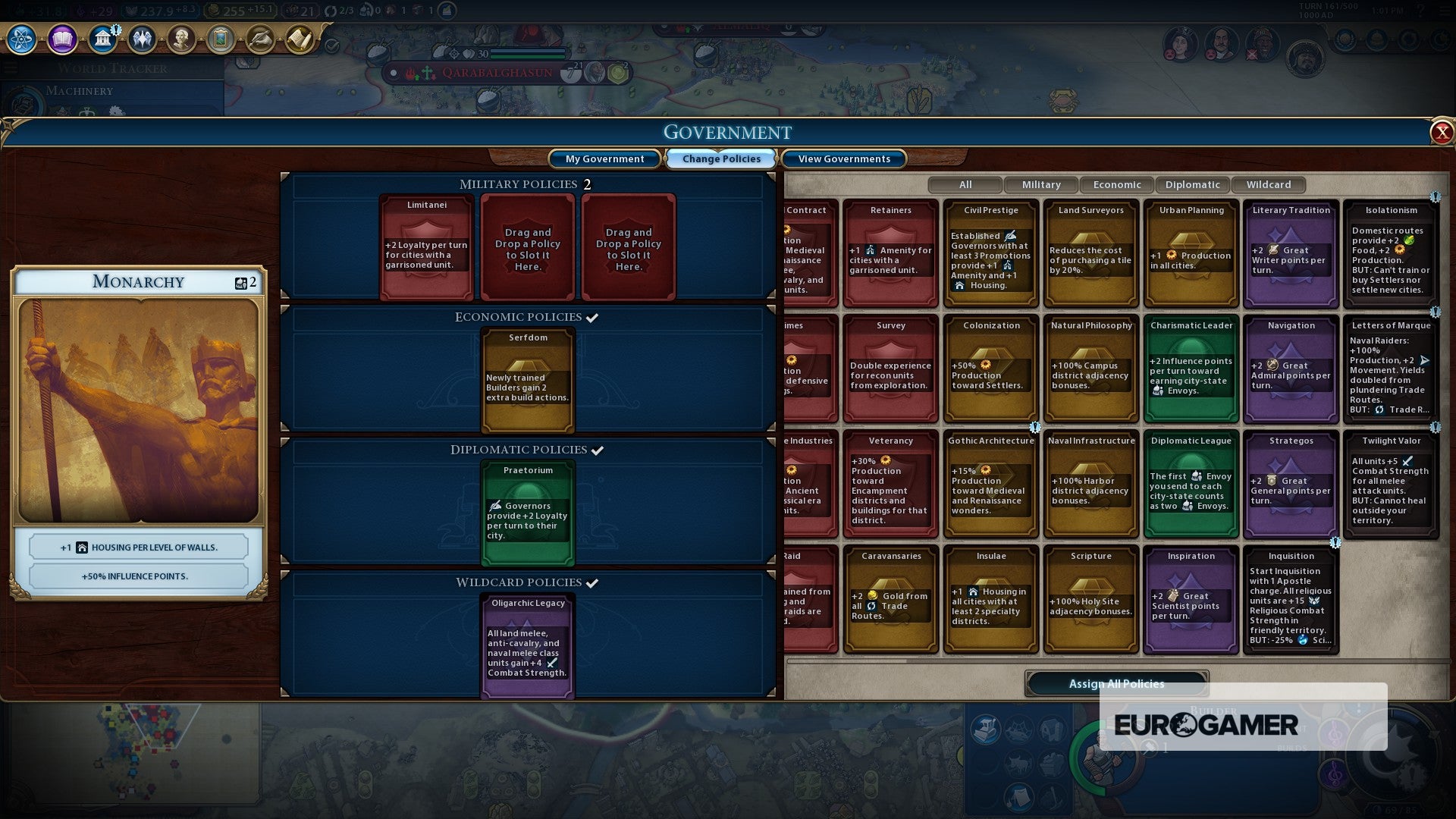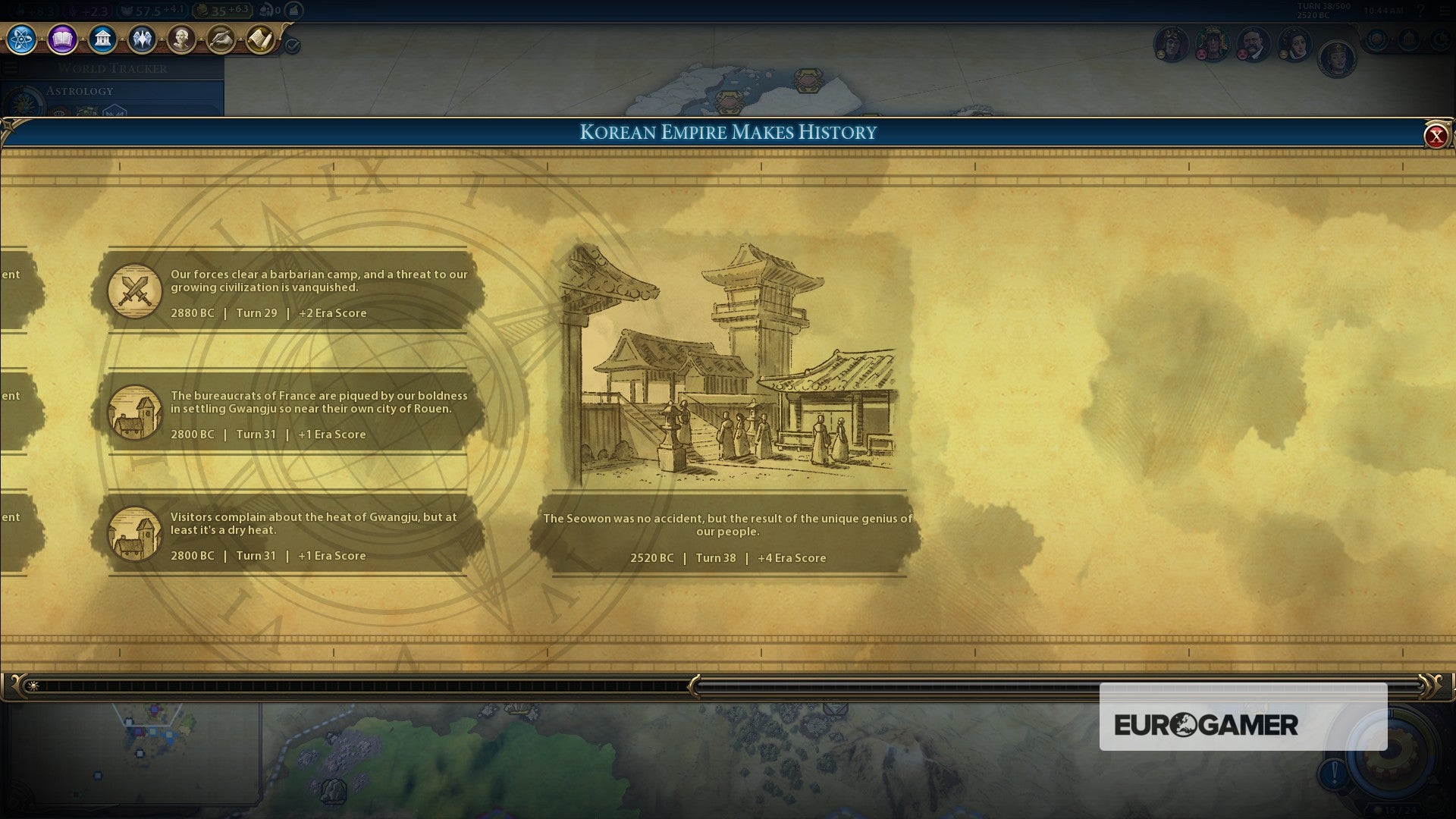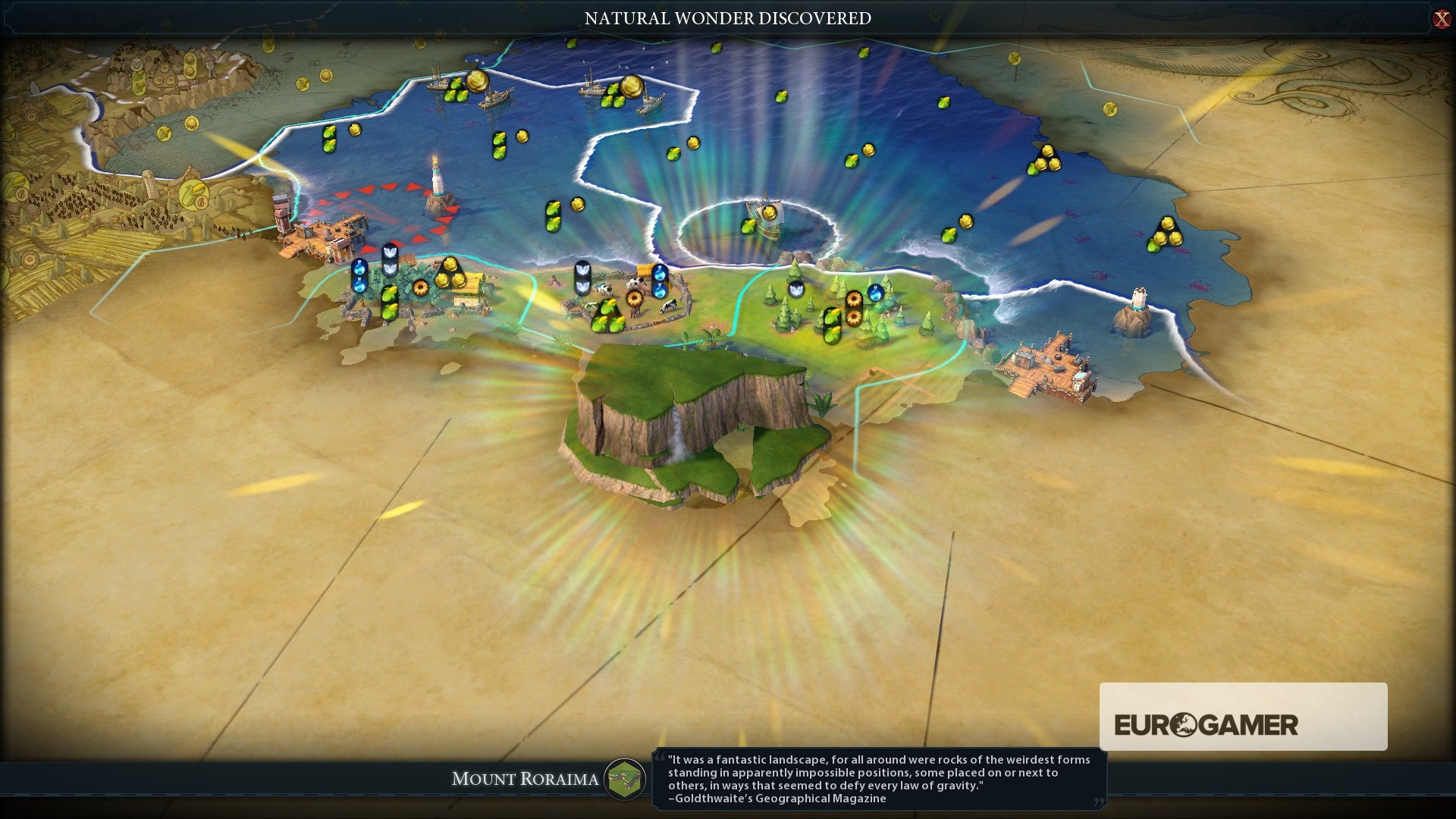Here on this page, we’ll be explaining not only how to earn Era Points which go towards your Era Score, but also how these play into the concepts of Great Ages and their various forms, too. A quick note: we’ve refreshed out Civ 6 guides for the game’s launch on Nintendo Switch, but just be aware that they contain information regarding the Rise and Fall DLC as well as the base game, which means some things only apply if you have that DLC! Otherwise… crack on! Thankfully they’re back, albeit this time in a much deeper and richer system than before. Here’s the basics of how they work:
As you progress through the Science tech tree, you’ll gradually progress through Eras, like the Classical Era or Modern Era. This works just as it does in vanilla Civ 6. Each time the world progresses from one Era to the next however, each Civ in the game will enter either a Dark Age, Normal Age, Golden Age or Heroic Age. The Age your Civ enters is determined by how much Era Score (your total Era Points) you earned in the previous Era. A set number of points is required for each type of Age. You can view how many turns there are left in the current Era by clicking on the Ages tab in the top right (near the City-States menu).
There are three types of Age you can normally earn - Dark, Normal and Golden - with the Heroic Age reserved for when you move straight out of a Dark Age to a Golden Age. Dedications are your rewards for achieving Normal, Golden or Heroic Ages - they act as a kind of incentive to specialise as you enter a new Era, with Normal Age Dedications granting you Era Score for certain actions, and Golden or Heroic Age Dedications granting you actual gameplay bonuses instead. Normal, Golden and Heoric Ages are of course better than Dark Ages, each providing rewards of some kind - but Dark Ages, despite restricting your access to Dedications, are still useful in their own right, providing you with special Government Policies only available in Dark Ages that encumber one aspect of your play whilst boosting another - like hindering Scientific progress for the sake of Religious benefits.
In brief then, the new system tasks you with earning Era Points and achieving a certain Era Score, and if your Era Score gets above a certain threshold, you’ll receive different choices of benefits for the upcoming Era depending on just how well you did in that last one. If your lust for Civilization 6 knowledge is still going strong, expansion owners should take a look at our Civ 6 Rise and Fall guide hub which takes you through the basics of everything new, whilst we have dedicated pages on Governors and Loyalty, along with how to earn Golden Ages, Era Points and Era Score through Historic Moments, and a full list of new Civs in Civ 6 Rise and Fall and other DLC. Otherwise, our Civilization 6 guide, tips and tricks covers the essentials before you master early game, mid-game and late-game strategies. We also have tips on the new Districts feature, a Leaders list with their Traits and Agendas, plus the best ways to get Gold, Science, and Faith, how to win by Religious Victory, and how to earn the elusive Science Victory and Military domination victory. Finally, here’s the Culture Victory, Foreign Tourism, and Domestic Tourism explained in depth. As a general rule of thumb, your Civ’s awarded Era Points for doing “notable things” or, in other words, achieving a Historic Moment. These can vary wildly, from defeating a Barbarian Unit to building a Wonder. They often come in the form of “firsts”, like the first time you build your Civ’s unique unit for instance, or if you’re the first Civ to discover a particular Natural Wonder or circumnavigate the globe (yes, Circumnavigation is back!). With that in mind - and the fact that there are well over 100 different Historic Moments you can achieve in-game - we won’t be listing them all here, but here’s a list of the major ones to look out for: Historic Moments and how to earn Era Points:
Barbarians - Defeating Barbarian units and clearing Barbarian camps is a good early-game source of Era Points, particularly if you’re the first Civ to do so. Exploration - Circumnavigating the globe gives you 3 Era Points, or 5 if you’re the first to do it. You also get points for foundling new cities, and discovering new Continents and Natural Wonders, particularly in the early game, and can boost this with exploration-based Dedications, too.
Districts and Buildings - Building a District for the first time in your Civ, and building any of your unique Districts or Buildings for the first time will award Era Points and count as Historic Moments. Technologies - You’ll find several “Many disputed the start of the Industrial/Modern/Information Era…” quotes popping up as you progress, as they’ll appear as Historic Moments when your Civ researches the first Technology of a new Era - there’s a boost to Era Points if you’re the first to reach the Era, too. Religion, Combat and Conquest - Capturing cities, declaring war, making peace, converting cities and defeating units in combat can all be Historic Moments, particularly when they happen for the first time. Religion and religious conquest and conversion also count, too. Wonders and Great People - Constructing a Wonder usually results in +4 Era Points, seeing as they’re such Historic Moments, and likewise recruiting Great People can earn you points, too. Trade and Diplomacy - Finally, establishing trade routes and completing them in other Civs for the first time, and likewise converting City States can all count for some Era Points, too.
In brief, earning Historic Moments is basically about keeping busy throughout the game, stopping that mid-game slump. You should constantly be looking for things to do - have I explored the whole map yet? Have I built my Civ’s unique unit even though I don’t need it for combat? Often, a handful of points can be earned in just a couple of turns, so keep the above principles in mind when you’re looking to just sneak into that Golden Age, or scrape through ahead of a Dark Age, too.



